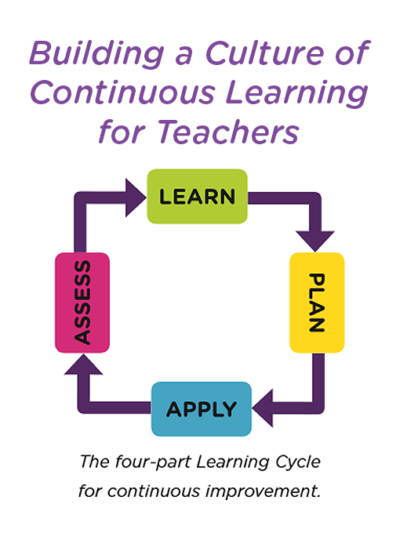Understanding the Learning Cycle Part Four: Assess
SEPTEMBER 13, 2021
Applying a new program or initiative in the classroom is often an act of faith. But teachers and school administrators shouldn't rely on faith to determine whether or not things are working. Ongoing assessment and evaluation is a critical part of the four-stage Learning Cycle. Let's take a closer look at how the Assess stage works and what teachers and school leaders should do with their findings.
The Role of Assessment in the Learning Cycle
Assessment is a critical component of the learning process. We assess students both during (formative) and after (summative) learning to measure progress towards learning goals. Assessment is every bit as important when it comes to applying new strategies and initiatives learning during professional development. During the Apply phase of the Learning Cycle, teachers use the strategies they learned in professional development with their students in the classroom. During the Assess phase, they look at the outcomes that they have achieved and determine whether or not the application was effective. The most important part of the Assess phase is making sure we are assessing the right things. When assessing the effectiveness of a professional development program and its impact on the classroom, it's easy to think in terms of teacher behaviors. Is the teacher implementing the new program or strategy correctly? Have they integrated it into their lesson plans? Can they model a classroom lesson using the program or strategy? These metrics are easy to evaluate during a classroom observation. But these observations only assess surface level compliance with the new initiative. What we really need to be assessing is not just teacher behaviors but student outcomes. This, after all, is the whole point of implementing new ideas in the classroom. Assessment looks at how well the initiative is meeting its objectives. This requires assessing student products. During the Assess phase for Thinking Maps, teachers bring in examples of Maps that students have created. Closely examining the work students have produced provides much better insights into how well an initiative is working than simply observing teachers in action.
Making Assessment Effective
To help teachers get the most out of the Assess phase of the Learning Cycle, school leaders need to set the right tone and establish a school culture of continuous improvement and collaboration. This phase of the learning cycle is not about evaluating teacher performance. It is a process engaged in by teachers and for teachers. The purpose of the Assess stage is to give teachers a structure to:
- determine what is and isn't working in their current classroom application,
- share successes and best practices,
- gather data to be used in further planning, and
- identify areas of need for further professional learning.
Here are some things to keep in mind during the Assess phase.
- Keep it collaborative. Assessment should take place in small groups or as a learning community.
- Make it an ongoing process. Collaboration periods provide excellent opportunities for both formal and informal assessment, and are often underutilized by teachers.
- Make it safe. Assessment is a vulnerable process, whether you are evaluating your own practice or offering observations on a colleague's. Make assessment sessions safe places to share not just successes but also talk about what isn't working and seek support from teacher leaders and colleagues.
- Provide a structure. Teacher leaders should be able to model effective assessment and facilitate collaborative sessions. When evaluating student work products, it can be helpful to have a rubric.
- Stay positive. Build a culture that celebrates success, promotes free sharing of ideas and best practices, and lets every teacher have a chance to shine.
- Focus on the outcomes. Remember that the ultimate measure of success is the impact that the strategy has on student thinking.
Most importantly, remember that assessment is part of a Learning Cycle. It is not an end in itself. The Assess phase leads smoothly back into the identification of additional opportunities for learning. The Learning Cycle is an ongoing process that forms the foundation of school culture of continuous improvement.
Questions to Think About
For teachers: What outcomes am I expecting to see when I implement this strategy in the classroom? What evidence can I look for to show I have achieved those outcomes? What questions and challenges came up during the Apply phase of the process? For administrators: Do teacher leaders have the training they need to model and facilitate effective assessment of classroom initiatives? When do teachers have the opportunity to come together for collaborative assessment? What additional learning opportunities have been identified during assessment?
Continue Reading
July 2, 2025
A Meta-Analysis of studies showed that coaching, along with group training, curricular and instructional resources made a larger impact on the effects of teaching and student achievement.
June 16, 2025
At Thinking Maps, we are committed to creating a platform that not only meets but exceeds the expectations of our users. That’s why we’re thrilled to roll out a host of new user experience updates to the Thinking Maps Learning Community (TMLC). These updates represent a significant leap forward in usability, design, and functionality, ensuring a seamless and engaging experience for all users.
May 29, 2025
When it comes to professional learning for teachers, coaching has emerged as an effective method for fostering meaningful, long-term change in teaching practices. By offering personalized support, ongoing feedback, and practical application, coaching meets teachers where they are and provides the tools they need to thrive.
March 19, 2025
When we align instruction with the way the brain prefers to receive information, we can reduce the “cognitive load” of learning and help students maximize understanding, retention and recall. These six brain-based strategies can help educators improve learning outcomes and make learning more fun and efficient.
